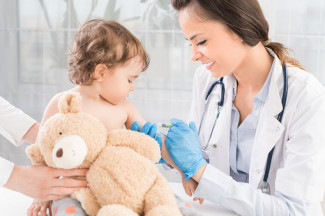
Johns Hopkins UniversityEst. 1876
America’s First Research University
A Call to Vaccinate

My latest book from the Johns Hopkins University Press was written as a literary form of crisis communications. Across parts of the United States and Europe we’ve now seen a reversal of some of the great public health gains achieved over the last two decades, mostly due to an aggressive and largely unopposed anti-vaccine movement. I became alarmed and wanted to write a unique book to slow or halt this rising tide of anti-science.
I became especially concerned about measles, a highly contagious viral infectious disease that killed more than 0.5 million people, mostly young children, annually in the late 1990s and early 2000s. Through a global vaccination strategy led by Gavi, the Vaccine Alliance, together with UNICEF, the World Health Organization, the Bill & Melinda Gates Foundation and other international health organizations, we achieved dramatic reductions in the deaths due to measles, for the first time reducing the number of childhood deaths to around 50,000, a 90 percent reduction! But then due to a well-organized anti-vaccine movement, vaccinations halted in parts of Eastern Europe, as well as in Italy and elsewhere in Western Europe, resulting in >60,000 measles cases in 2017-18 so far (according to the WHO), while last year a measles outbreak raged through the Twin Cities of Minnesota causing more than 20 children to require hospitalization.

The major weapon used by the anti-vaccine lobby is their assertion that childhood vaccines lead to autism. I felt I was in a unique position to counter their phony claims because I’m a vaccine scientist and pediatrician, but also an autism dad, the father of Rachel, my 26 year old adult daughter with autism and intellectual disabilities. In contrast to some of the other excellent books chronicling the awful history of the modern anti-vaccine movement that many say began in 1998, I wanted to tell a different type of story.
First, I go into some detail on the science of autism, explaining the autism spectrum and how it’s a neurodevelopmental process that begins prenatally, and why there’s no plausible way in which vaccines could cause autism. I report on some of the genes linked to autism, including the results of whole exome sequencing we did for Rachel’s DNA. I also discuss some of the unique features regarding girls and women on the autism spectrum and how the co-morbidities such as obsessive-compulsive disorder, attention deficit hyperactivity disorder, and even eating disorders can mask an autism diagnosis.
But then throughout the book I weave in a very personal story about Rachel and the impact she has had on my family, including Ann, my wife of more than 30 years, and our other adult children. I also try to give the reader a glimpse into my life as a scientist leading a team to develop new vaccines for poverty-related neglected tropical diseases, such as hookworm infections, schistosomiasis, Chagas disease, and leishmaniasis – or what I often call “the most important diseases you’ve never heard of.”
The result I think is quite a unique book, which I hope shifts the dialogue about autism away from false claims alleging links to vaccines, to instead focus on where need to put our energies – more research to understand the neurobiology of autism, better awareness regarding autism’s co-morbid conditions, the unique features of autism in women and girls, and the social and employment services, which families desperately need and deserve when challenged with a loved one on the autism spectrum. Helping in this charge is an excellent book foreword by the renowned NYU bioethicist, Arthur L. Caplan.
I hope that the book reaches lay audiences interested in autism, as well as “vaccine hesitant” parents who might be having second thoughts about immunizing their children. My book is also meant to support the many thousands of pediatricians, nurse practitioners, and other healthcare providers faced with parents who are reluctant or resistant to vaccinate by providing them with timely information and talking points.
My dream is that the release of this book marks a turnaround for global vaccine programs, which have stalled in some areas of North America and Europe. The pro-vaccine side needs to regain strength and optimism and to erase the pockets of low vaccine coverage and hesitancy in Europe and the US, but also to prevent any spread of anti-vaccine activities into Africa, Asia, and Latin America. To do otherwise and allow drops in vaccine coverage in low- and middle-income countries would, I feel, create new and catastrophic public health emergencies.
Peter Hotez MD PhD is professor of pediatrics and dean of the National School of Tropical Medicine at Baylor College of Medicine, where he is also director of the Texas Children’s Hospital Center for Vaccine Development. He is the author of Vaccines Did Not Cause Rachel’s Autism.


